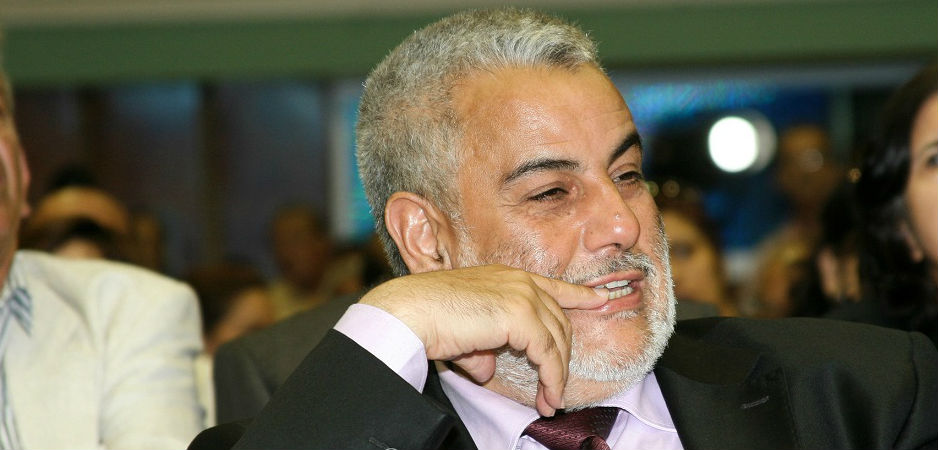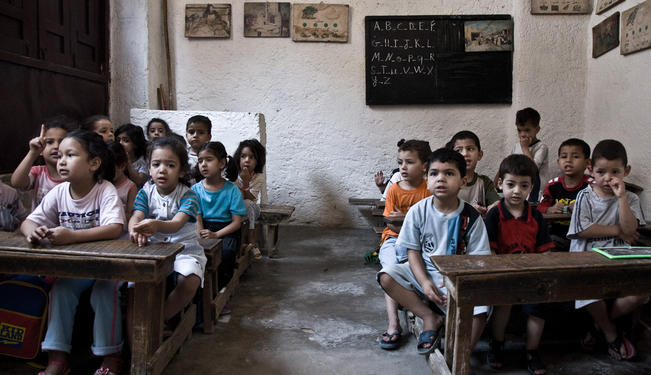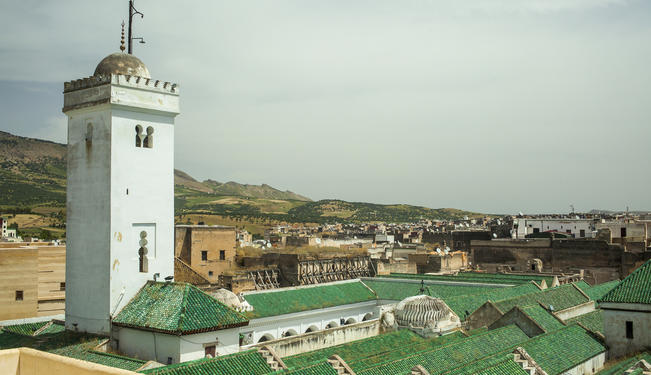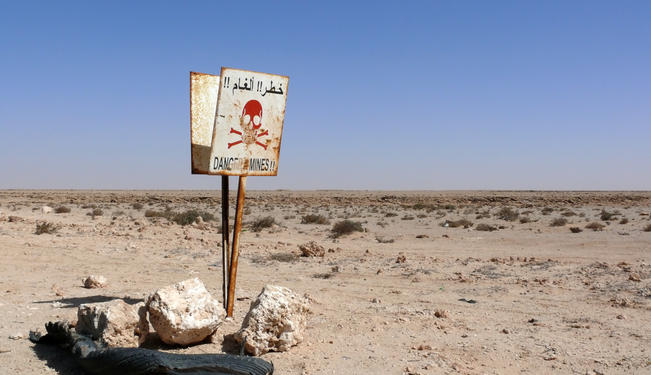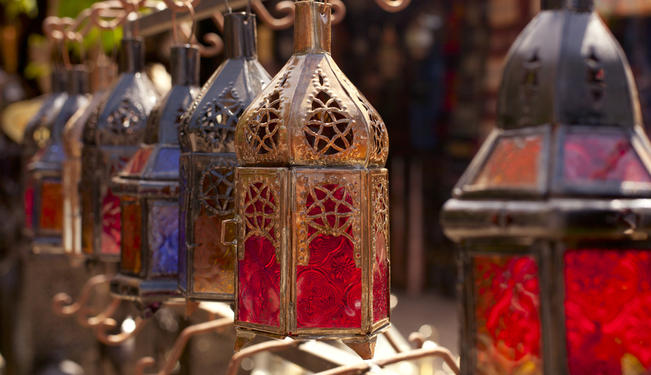The Moroccan monarchy only strengthens actors and groups in favor of its hegemony.
These past few months have been a particularly turbulent period for Morocco’s Party of Justice and Development-led coalition government. While King Mohammed VI was on an extended vacation in France during May and June 2013, the conservative nationalist Istiqlal Party announced it was withdrawing from the coalition.
Hamid Chabat, Istiqlal’s recently elected leader, cited the “slow pace” of reforms as a point that drove him and his party to decide on the departure from the ruling coalition to the parliamentary opposition. The decision necessitated Mohammed VI’s intervention and resulted in a dragged out political spectacle surrounding the question of whether the Party of Justice and Development (PJD) would be able to strike an alliance with another party to fill the void Istiqlal left, or call for early elections.
To no one’s surprise, the space was filled with the National Rally of Independents (RNI) — a party known for its close ties to the palace and whose members staunchly jeered the PJD-led government from the opposing side of parliament only months ago. The integration of the RNI in the coalition saw the reappointment of various officials who were voted out of their posts during the November 2011 elections. It also pushed the PJD out of several key ministries and left it outnumbered by its coalition partners.
Since its departure from the coalition, the Istiqlal Party has adopted a seemingly critical tone against the PJD and its allies. More recently, on the weekend of September 21, 2013, the Istiqlal Party and the UGTM trade union, which is a union associated with the party, organized a “protest” in Rabat denouncing the rising costs of living. The footage and images from the “protest” were reproduced on international media and wrongly characterized under the same light as the February 20 Movement protests, which initially sprung out as a reaction to the uprisings in the region.
Such mischaracterization of the Istiqlal’s “dissent” paints an incomplete picture of the party’s own aspirations. More importantly, it uncritically adopts the party’s narrative as being an “ally” of the people, when in fact, as a member of the ruling coalition, they were involved with the very budgetary negotiations that resulted in the rising cost of living.
Ironically, Nizar Baraka, a member of the Istiqlal Party, was the minister of finance and economy under Prime Minister Abdelilah Benkirane’s cabinet, and was compelled to resign from his ministerial post only as a result of Istiqlal’s withdrawal from the coalition this past summer. It was under his stint as minister of finance and economy that negotiations for the $6.2 billion loan from the International Monetary Fund (IMF) were finalized.
This indicates that the Istiqlal Party was well aware of the energy and food price hikes that were scheduled to take place as soon as Ramadan ended (Istiqlal announced its withdrawal from the coalition just weeks before Ramadan began).
Political Maneuvering in Morocco
With its experiences as the oldest party that is still functioning, the implications are that the Istiqlal Party is familiar with the maneuvers that yield political gains within the Moroccan political system. Such views are widely held among Moroccans who have been critical of the regime’s response to demands for reform.
It was under Istiqlal’s leadership as coalition leader that the February 20 Movement began protesting in early 2011 in reaction to the uprisings across the region. While the movement tended to avoid targeting the monarchical institution, the Istiqlal-led government was fair game for the movement and the king responded by announcing that early elections would take place in the same year protests began.
There were also indications that the Istiqlal Party was taking the criticism directed toward it and attempting to reform the party’s structure from within. In a break from its past leadership, which has generally tended to come from the Fassi family, Fes Mayor Hamid Chabat was elected as the party’s leader.
Chabat’s election to the leadership of the Istiqlal Party came only months before his expressed intention to withdraw from the ruling coalition. Ironically, among the reasons cited for Istiqlal’s decision, Chabat cited the PJD’s slow pace of applying reforms. The press release that announced the party’s decision employed shifty rhetoric, claiming its decision was rooted in wanting to “avoid being complicit in the scheme against the Moroccan people.”
The language assumes that the party itself has been removed from this alleged “scheme.” If precedence holds any significance, not only has the Istiqlal Party existed and functioned within the power dynamics of the Moroccan regime for nearly 70 years, but up until Chabat’s election as party leader, the party was an active player and member of the current ruling coalition, holding several key ministerial portfolios.
Istiqlal’s evasion of complicity in this “scheme” presumes a degree of insulting naiveté on the part of the Moroccan people. It is then a twisted turn of events when the Istiqlal Party organized and led protests in Rabat railing against the PJD-led coalition, when just months before, its members stood on the same side of the aisle as their current opponents. It is even more ironic that the party that replaced Istiqlal’s position in the coalition — the Salehddine Mezouar-led National Rally of Independents (RNI) was one of the most outspoken critics of the PJD.
For months, Mezouar slammed Benkirane and his party on national and international media networks, while attempting to display a “concern” over the lack of reforms. Like the Istiqlal Party, the RNI also held a position in the ruling coalition in the previous government before the November 2011 elections and during the beginning of the February 20 Movement protests.
Several of its party members, including Yassir Zenagui, who was minister of tourism in the previous government, saw his position royally upgraded to adviser to the king. Another former RNI member, Aziz Akhennouch, resigned from his party during the change in government so he could maintain his ministerial portfolio at the ministry of agriculture and fisheries as a technocrat — making him the only minister to maintain his position through the November 2011 elections.
Rendering the Parliamentary Election Process Futile
The fluidity through which parties float from the coalition to the opposition and from the opposition to the coalition, reveals more than just the pursuit of political interests (i.e. Istiqlal wanting to disassociate itself from the price hikes on food and fuel). This fluid movement practically renders the parliamentary election process in Morocco futile.
Even if the parliamentary elections were intended to feed a narrative of a liberalizing political system, the shifting movements of political parties reverses any changes brought about by an electoral process. Moreover, the inability of parties to tow a consistent political line places more reliance on the monarchy as an institution, especially when it constantly intervenes in inter-party disputes at the expense of policy-making.
The palace (the king and his shadow cabinet) is increasingly viewed as a stable mediating actor, rather than its true nature as an institution that operates with unchecked powers and impunity. It is through this strategy of capitalizing from the partisan squabbles among political parties that the monarchy has anchored itself in Morocco’s political landscape as a “uniting” and seemingly “necessary” actor.
The monarchy’s position as a “mediator” among political parties has gained greater traction recently, following the king’s new cabinet appointments. Mohammed VI reshuffled the cabinet as a step in the process of transitioning RNI into the coalition. Various rumors that preceded the final cabinet list were confirmed, such as Mezouar’s newfound position as the foreign minister, which pushed the PJD out of a strategic ministry. (Lakome also aptly points out that the PJD is now a minority in its own government).
While under PJD member Saad Eddine El Othmani’s leadership, the tension between the palace and the PJD over foreign policy became increasingly scrutinized. For example, the palace and the foreign ministry reactions toward the June 30 protests in Egypt that led to Mohammed Morsi’s ouster were starkly different in tone; though ultimately, the palace wields power over the ministry.
A foreign ministry held by Mezouar, who was formerly minister of finance under the previous government and minister of industry and commerce before that as well, will reveal less tension in terms of Morocco’s foreign policy. It is also important not to discount Taib Fassi-Fihri’s ongoing influence and involvement in foreign policy, despite the fact that he formally left the ministry in 2011 for a position as one of the king’s royal advisers.
The New Cabinet: A Step Back for Democracy
The new cabinet, which was announced on October 10, 2013, also drew discussion over its inclusion of more technocrats with close ties to the palace and former ministers who served as far back as under the reign of the late Hassan II. The inclusion of such figures bolsters claims that Morocco’s alleged “path toward reforming,” which some argue has never taken off in the first place, is quite visibly a regressive path.
It is becoming more and more evident that the Moroccan regime has slipped comfortably into a deeply authoritarian nature and continues to tirelessly silence critiques. A recent example is the case of Ali Anouzla, a Moroccan journalist and editor of the Arabic version of an independent online media publication, Lakome.
Anouzla was arrested on September 17, 2013, under the pretext of “inciting terrorism” after he published an article that directed readers to a link displaying an Al Qaeda in the Islamic Maghreb (AQIM) video. He remains imprisoned under the 2003 “anti-terrorism” law on orders from the General Crown Prosecutor of Rabat. Anouzla’s arrest fits into a wider context, where the Moroccan regime has continuously gone after critical journalists and activists, even despite the 2011 constitution, which allegedly includes articles “protecting” the freedom of expression. Anouzla has repeatedly been critical of the regime, the monarchy, and its policies.
Between food and fuel price hikes, the contradictory shifting alliances of political parties, and the ongoing detainment of critical voices, the status quo has grounded itself within the political fabric of the Moroccan regime. It is becoming increasingly difficult for even the regime to adhere to its “liberalizing” and “reforming” narrative it put forth when protests began in February 2011. And as these authoritarian policies and practices gain greater traction, Benkirane and the PJD have displayed a level of passivity that conflict with their claims and views when they were campaigning for the November 2011 elections.
Essentially, the palace has strengthened itself at the expense of other government institutions, which could have had the potential to emerge as sources of power independent of the monarchy, such as the parliament and the judiciary.
The palace has embedded itself as a parasitic institution that only strengthens actors and groups in favor of its hegemony, while co-opting and marginalizing critical actors and groups that attempt to work within the existing paradigm. In this sense, the palace has demonstrated that the greatest obstacle in the pursuit of this “path” toward a more “democratic Morocco” is itself.
*[This article was originally published by Jadaliyya.]
The views expressed in this article are the author's own and do not necessarily reflect Fair Observer’s editorial policy.
Image: Copyright © Shutterstock. All Rights Reserved
For more than 10 years, Fair Observer has been free, fair and independent. No billionaire owns us, no advertisers control us. We are a reader-supported nonprofit. Unlike many other publications, we keep our content free for readers regardless of where they live or whether they can afford to pay. We have no paywalls and no ads.
In the post-truth era of fake news, echo chambers and filter bubbles, we publish a plurality of perspectives from around the world. Anyone can publish with us, but everyone goes through a rigorous editorial process. So, you get fact-checked, well-reasoned content instead of noise.
We publish 2,500+ voices from 90+ countries. We also conduct education and training programs
on subjects ranging from digital media and journalism to writing and critical thinking. This
doesn’t come cheap. Servers, editors, trainers and web developers cost
money.
Please consider supporting us on a regular basis as a recurring donor or a
sustaining member.
Support Fair Observer
We rely on your support for our independence, diversity and quality.
Will you support FO’s journalism?
We rely on your support for our independence, diversity and quality.



